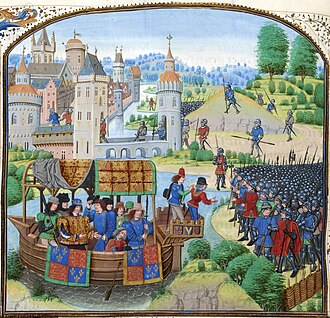



The Peasants' Revolt, also named Wat Tyler's Rebellion or the Great Rising, was a major uprising across large parts of England in 1381. The revolt had various causes, including the socio-economic and political tensions generated by the Black Death in the 1340s, the high taxes resulting from the conflict with France during the Hundred Years' War, and instability within the local leadership of London. The revolt heavily influenced the course of the Hundred Years' War by deterring later Parliaments from raising additional taxes to pay for military campaigns in France.
Interpretations of the revolt by academics have shifted over the years. It was once seen as a defining moment in English history, in particular causing a promise by King Richard II to abolish serfdom, and a suspicion of Lollardy, but modern academics are less certain of its impact on subsequent social and economic history.
The revolt has been widely used in socialist literature, including by the author William Morris, and remains a potent symbol for the political left, informing the arguments surrounding the introduction of the Community Charge in the United Kingdom during the 1980s.
The term "Peasants' Revolt" does not occur in medieval sources: contemporary chronicles did not give the events a specific title, and the term "peasant" did not appear in the English language until the 15th century. In the eighteenth and nineteenth centuries it was generally known as "the Insurrection of Wat Tyler". Though he commented that "which eighteenth- or nineteenth-century historian first used the doubly discredited phrase 'Peasants' Revolt' I have been unable to determine", Paul Strohm's first identified usage of the term was in John Richard Green's Short History of the English People in 1874. The name has been critiqued by modern historians such as Strohm and Miri Rubin, both on the grounds that many in the movements were not peasants, and that the events more closely resemble a prolonged protest or rising rather than a revolt or rebellion. Alternative terms include "the 1381 Rising" and "the English
Rising of 1381".
The Peasants' Revolt was fed by the economic and social upheaval of the 14th century. At the start of the century, the majority of English people worked in the countryside economy that fed the country's towns and cities and supported an extensive international trade. Across much of England, production was organised around manors, controlled by local lords – including the gentry and the Church – and governed through a system of manorial courts. Some of the population were unfree serfs, who had to work on their lords' lands for a period each year, although the balance of free and unfree varied across England, and in the south-east serfdom was relatively rare. Some serfs were born unfree and could not leave their manors to work elsewhere without the consent of the local lord; others accepted limitations on their freedom as part of the tenure agreement for their farmland. Population growth led to pressure on the available agricultural land, increasing the power of local landowners.
In 1348 a plague known as the Black Death crossed from mainland Europe into England, rapidly killing an estimated 50 percent of the population. After an initial period of economic shock, England began to adapt to the changed economic situation. The death rate among the peasantry meant that suddenly land was relatively plentiful and labourers in much shorter supply. Labourers could charge more for their work and, in the consequent competition for labour, wages were driven sharply upwards. In turn, the profits of landowners were eroded. The trading, commercial and financial networks in the towns disintegrated.
The authorities responded to the chaos by passing emergency legislation, the Ordinance of Labourers in 1349, and the Statute of Labourers in 1351. These attempted to fix wages at pre-plague levels, making it a crime to refuse work or to break an existing contract, imposing fines on those who transgressed. The system was initially enforced through special Justices of Labourers and then, from the 1360s onwards, through the normal Justices of the Peace, typically members of the local gentry. Although in theory these laws applied to both labourers seeking higher wages and to employers tempted to outbid their competitors for workers, they were in practice applied only to labourers, and then in a rather arbitrary fashion. The legislation was strengthened in 1361, with the penalties increased to include branding and imprisonment. The royal government had not intervened in this way before, nor allied itself with the local landowners in quite such an obvious or unpopular way.
Over the next few decades, economic opportunities increased for the English peasantry. Some labourers took up specialist jobs that would have previously been barred to them, and others moved from employer to employer, or became servants in richer households. These changes were keenly felt across the south-east of England, where the London market created a wide range of opportunities for farmers and artisans. Local lords had the right to prevent serfs from leaving their manors, but when serfs found themselves blocked in the manorial courts, many simply left to work illegally on manors elsewhere. Wages continued to rise, and between the 1340s and the 1380s the purchasing power of rural labourers increased by around 40 percent. As the wealth of the lower classes increased, Parliament brought in fresh laws in 1363 to prevent them from consuming expensive goods formerly only affordable by the elite. These sumptuary laws proved unenforceable, but the wider labour laws continued to be firmly applied.

| Active Year (Start) | 1381-05-30 |
|---|---|
| Active Year (End) | 1381-11-00 |
| History | 1381-11-00 |
| Country | Kingdom of England |
| Location | England |